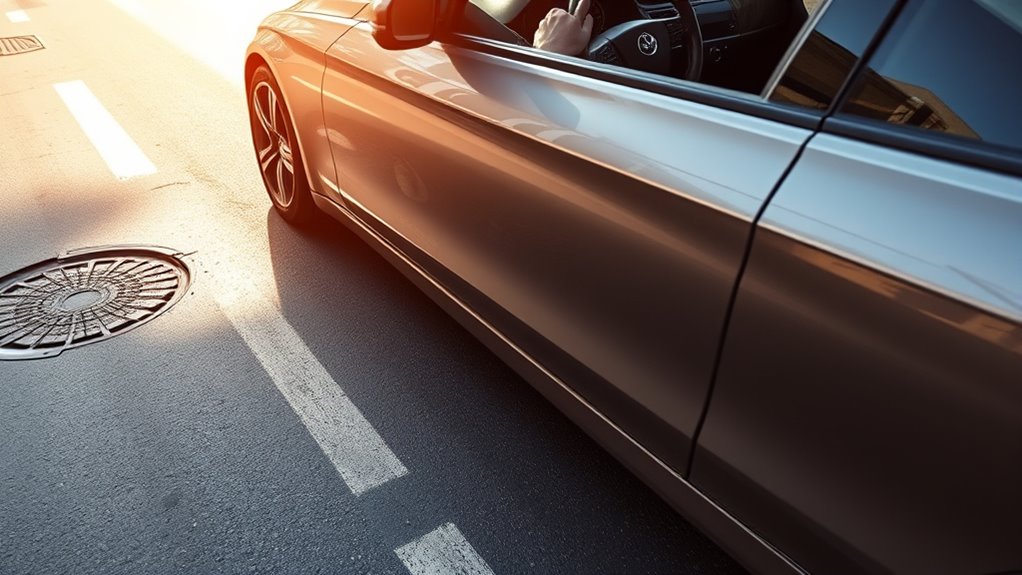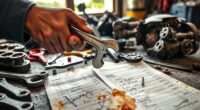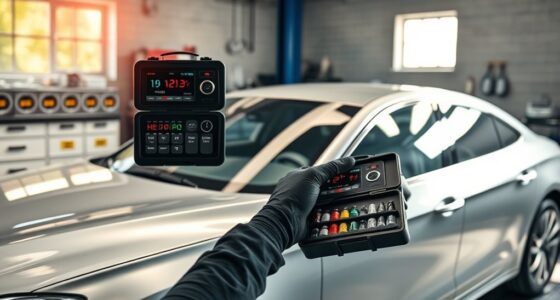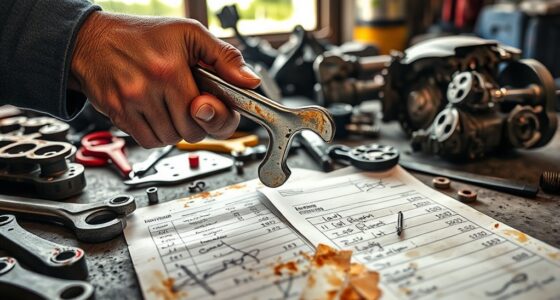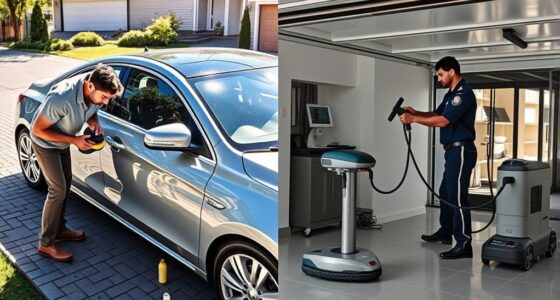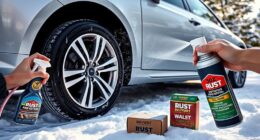Your driving habits play a big role in your car’s maintenance costs. Opting for smooth acceleration and gradual braking reduces stress on your engine, tires, and other components, helping them last longer. Fast driving and sharp turns cause uneven tire wear and quicker wear on brakes and suspension, leading to more repairs. Keeping your driving gentle saves money over time. If you want to discover how specific habits can lower your expenses even further, keep exploring the details.
Key Takeaways
- Aggressive driving causes more wear on engine parts, brakes, and tires, leading to higher repair costs.
- Smooth driving maintains optimal tire pressure and reduces uneven tire wear, extending tire lifespan and saving money.
- Rapid acceleration and sudden braking increase stress on vehicle components, accelerating their deterioration and repair needs.
- Consistent, steady speeds improve fuel efficiency, lowering fuel expenses and overall maintenance costs.
- Regular vehicle maintenance and gentle driving habits prevent premature breakdowns and reduce unexpected repair expenses.
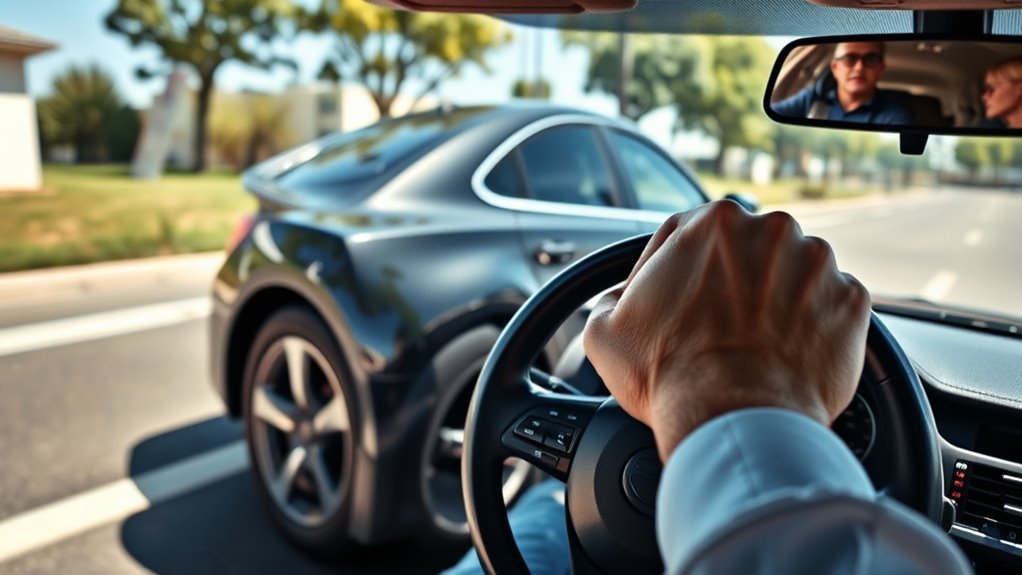
Your driving habits directly impact how much you spend on car maintenance. How you handle your vehicle day to day can influence everything from fuel efficiency to the lifespan of your tires. When you accelerate abruptly or brake suddenly, your car works harder than necessary, which not only burns more fuel but also accelerates tire wear. Consistently aggressive driving habits push your engine and tires to their limits, leading to more frequent repairs and replacements. Conversely, smooth acceleration and gradual braking help your vehicle operate more efficiently, saving you money over time.
Smooth driving habits reduce maintenance costs and extend vehicle lifespan.
Fuel efficiency is a significant factor in maintenance costs, and your driving style plays a big role here. When you accelerate quickly or drive at high speeds, your engine consumes more fuel, making each trip more expensive. Over time, poor fuel efficiency can add up to hundreds of extra dollars annually. Maintaining steady speeds, avoiding rapid acceleration, and keeping an eye on your speedometer can drastically improve your vehicle’s mileage. Additionally, proper tire maintenance—like keeping tires properly inflated—is essential. Under-inflated tires increase rolling resistance, which decreases fuel efficiency and causes uneven tire wear. When tires wear unevenly or prematurely, you’re more likely to need replacements sooner, which adds to your overall maintenance costs.
Your driving habits also influence how quickly your tires wear out. Hard cornering, sudden stops, and aggressive acceleration cause uneven tire tread wear, reducing the lifespan of your tires. This means you’ll need to replace them more often, which can be a significant expense. On the other hand, gentle driving extends tire life and reduces the need for frequent replacements. Regularly checking tire pressure and rotating tires according to the manufacturer’s recommendations can prevent uneven wear and maximize their lifespan, translating into fewer trips to the shop and lower costs.
Furthermore, aggressive driving can put unnecessary strain on your vehicle’s components, increasing the likelihood of breakdowns and repairs. For example, frequent rapid acceleration and deceleration put extra stress on your transmission, brakes, and suspension system. Over time, this accelerates wear and leads to costly repairs. By adopting calmer driving habits, you not only improve your fuel efficiency and extend tire life but also reduce the overall wear and tear on your vehicle’s parts. This proactive approach helps you avoid unexpected breakdowns and keep maintenance costs manageable. Additionally, understanding how home theatre projectors work can guide you in choosing the most efficient and durable options, further reducing long-term expenses.
Frequently Asked Questions
How Does Driving in City Traffic Affect Maintenance Costs?
Driving in city traffic, especially with urban congestion and stop-and-go driving, increases your car’s wear and tear. Frequent stopping and accelerating strain your transmission, brakes, and engine, leading to more frequent repairs. You might also find yourself replacing parts like brake pads and tires sooner. To save on maintenance costs, try to avoid heavy traffic when possible, and drive smoothly to reduce stress on your vehicle.
Do Frequent Long Trips Increase Car Repair Expenses?
Frequent long trips can indeed increase your car repair expenses. As you cruise on long journeys, tire wear accelerates, and fuel efficiency drops due to prolonged engine operation. You might notice more frequent tire replacements and higher fuel bills. Long trips also put extra strain on your engine and brakes, leading to potential repairs down the road. So, while enjoyable, long trips demand more maintenance, making costs climb higher.
How Does Aggressive Driving Influence Vehicle Longevity?
Aggressive driving can markedly reduce your vehicle’s longevity. By speeding, braking hard, and rapid acceleration, you increase brake wear and decrease fuel efficiency. These habits strain your car’s engine and braking system, leading to more frequent repairs and replacements. To extend your vehicle’s life, drive smoothly, maintain steady speeds, and avoid aggressive maneuvers. Doing so helps save money, preserves your car’s condition, and improves overall safety.
Can Poor Road Conditions Impact Maintenance Frequency?
Poor road conditions can markedly increase your maintenance frequency. When you drive on rough or uneven surfaces, it accelerates tire wear and puts extra strain on your suspension system. This leads to more frequent tire replacements and potential suspension issues, which can be costly over time. To minimize these effects, try to avoid bad roads when possible, and have your vehicle inspected regularly to catch problems early.
Does Driving Less Frequently Reduce Overall Maintenance Costs?
Ever wonder if driving less can save you money? When you reduce your driving, you often improve fuel efficiency and decrease tire wear, which means fewer trips to the mechanic. Less frequent driving means your car experiences less stress, reducing overall maintenance costs. So, yes, driving less can help you cut expenses, especially by extending the lifespan of key parts and lowering your repair bills over time.
Conclusion
Your driving habits shape your car’s future more than you realize. Small changes now could save you big on maintenance costs later—if you catch the signs early. But what if you’re unknowingly speeding up wear and tear? Stay alert, because the next drive might hold the key to avoiding costly repairs. The choices you make behind the wheel today could mean the difference between smooth sailing and unexpected expenses tomorrow. Are you ready to take control?
